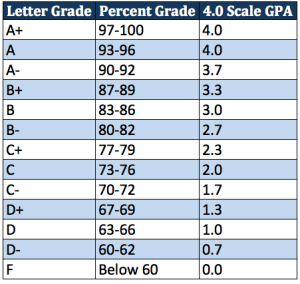As college students, so many people tell you to stop procrastinating. Your parents, your teachers, and you know it’s not beneficial. But, you’re probably not told how to stop procrastinating.
I know I’m guilty in some of my blog posts for telling you to not procrastinate and then I move on to another point, without giving you advice on how to stop this bad habit. So, to right the wrong for others and myself, I’m going to share 13 different strategies that have worked for successful college students (and myself) to help you take action instead of putting off your tasks, goals, and dreams.
Ways To Beat Procrastination
1. Break down your assignment into smaller tasks.
Many times people procrastinate on an assignment because they fear it is too big and overwhelming. By breaking it into smaller tasks, you’re able to have confidence when you tackle the smaller work. It’s the same idea as this: “How do you eat a whale? One bite at a time.”
2. Create a timeline of doing the tasks.
If you don’t have specific deadlines for your tasks and goals, then you will continue to put them off. Don’t get in the habit of this. Instead, write a timeline down of when you’re completing each activity.
3. Write down the night before what you’re going to do the next day.
This tactic protects you from procrastination because it gives you a clear action plan for the next day. You don’t have to waste any time thinking about what you’re going to do when you wake up, because it’s already there for you. Positive momentum is crucial when stopping procrastination.
4. Think of getting what you don’t want because of procrastination.
If you get motivated by imagining how bad you will feel if the work goes unfinished, then use this. This strategy will work better the more specific you get. So, envision yourself procrastinating too much to the point where you fail an exam. Or, you procrastinated preparing for an interview and cost yourself a dream internship or job.
5. Think of how good you will feel if you get it done.
Positive thoughts are powerful, and that’s why envisioning your sense of relief and accomplishment after acing an exam or a paper will help you finish the task. Your actions follow what your mind beliefs.
6. Reward yourself for small achievements.
Knowing that there is a reward at the end of your hard work is motivating. For example, after you study for two focused hours then you will get Chipotle. This helps beat procrastination by attaching a perceived negative time with a good time.
7. Give yourself a motivational talk as if you are talking to a friend.
This sounds strange, but talking to yourself like you are talking to a close friend works. We are often more honest and reasonable with our friends than when we mentally talk to ourselves. I believe we are the number one liar to ourselves, so when going to a different mindset we can be more productive.
8. Imagine what a specific top-performing person would do.
This motivates me when I want to put something off. I imagine someone like Michael Jordan and I know he would fight through the temptation to procrastinate. So, in wanting to be great, like Michael, this quick thought pushes me through moments when it’s difficult.
9. Find an inspiring partner.
Finding a good accountability partner will benefit both your partner and you—meet regularly and set focused guidelines for success. However, make sure you find the right person, or this plan to be productive can take a turn for the worse into hours of procrastination.
10. Spend time with people who are hard-working.
People naturally want to fit in and join friends in what they’re doing. So, by spending time with people who are focused and don’t procrastinate much, then they will rub off on you to decrease your procrastination.
11. Go to the right environment where you focus best.
Reflect and experiment with different locations (library, coffee shop, room, etc.) where you get your most focused work done and then let that place be your haven to avoid procrastination. Successful writers are just one example of people who make an effort to do work in a specific environment.
12. Speak publicly about your goals.
Tell those close to you about what you want to accomplish and why. Then when you talk with them again, it’s likely that they will ask you about your goal. Even if they don’t ask you, telling people motivates yourself to take action.
13. Attach a greater purpose to your assignments.
You may find yourself in a required class you don’t need the knowledge from, so instead of hating that class change your attitude. Do this by having the perspective that it is another stair to climb to get you closer to reaching your goal of getting accepted to grad school, so you have a certain job. Positive thoughts go a long way.
Last Words
This list isn’t to say that all of these strategies will work for you. The idea here is for you to find at least one tactic that you can use to increase your productivity and limit procrastination. Start attempting one of these tactics next time you need to get something done, and see if it works for you. If it doesn’t, then move on to another one.
The more we experiment, no matter the result, the better we can understand how we do our best work and fine-tune our college success.
Readers, comment below on: What productivity tips to stop procrastinating work for you? What are common scenarios where you procrastinate, and why? Have you ever put off a task for days, weeks, and months, then looked back and saw you still haven’t done it?



